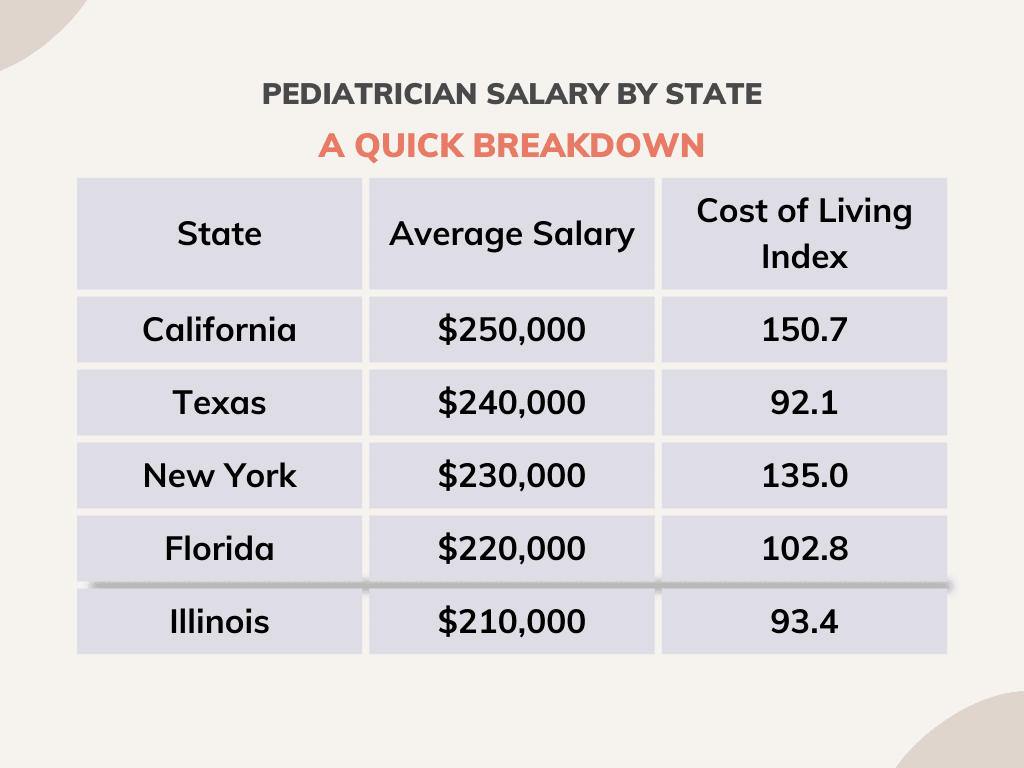Do you know the average pediatrician’s salary and how to increase it with strategic negotiations? As a pediatrician, understanding the pediatrician salary average is essential in maximizing your earning potential. Although working with children is a rewarding and impactful career, many pediatricians earn less than other medical professionals. The pediatrician’s salary average can vary greatly depending on location, experience, and type of practice. In this article, we’ll explore how you can negotiate a higher salary and boost your income while staying in your current location.

Why Negotiating Your Pediatrician Salary Matters
For many pediatricians, negotiating a salary can feel intimidating or even uncomfortable. However, failing to advocate for your worth can lead to regret in the long run. According to recent studies, pediatricians’ salaries range from $200,000 to over $250,000 annually, depending on the state. Moreover, your ability to negotiate can have a long-term impact on your financial future, from annual raises to retirement savings.
Key Reasons to Negotiate:
- Higher earning potential: Negotiating early in your career sets the stage for future salary increases.
- Job satisfaction: A well-compensated position can improve work-life balance and job satisfaction.
- Competitive market: In certain regions, the demand for pediatricians allows more leverage during salary discussions.
Taking control of your financial future ensures you’re compensated fairly for your crucial work. Looking to increase your earning potential in healthcare? Discover comprehensive salary negotiation strategies tailored to healthcare professionals.

Factors That Impact Pediatrician Salary Average Across the U.S.
To effectively negotiate your salary, it’s important to understand the key factors that impact pediatrician salaries across the United States. These include:
1. Geographic Location and Its Effect on Pediatrician Salary Average
The cost of living and demand for healthcare professionals vary from state to state. For example, pediatricians in states like California, Texas, and New York earn higher salaries due to the demand for specialized pediatric care in urban areas.
- High-paying states: California, Texas, New York, Massachusetts
- Lower-paying states: West Virginia, Arkansas, Mississippi
Healthcare salaries can vary widely across regions. Check out healthcare salary variations across the U.S. to see where your field is most lucrative.
2. Years of Experience
Like most medical fields, salary increases with experience. Entry-level pediatricians may start at the lower end of the salary scale, but mid-career professionals can command significantly higher pay.
- Entry-level salary: $150,000 – $180,000
- Experienced salary: $230,000 – $250,000
3. Practice Setting
The type of practice also affects your earning potential. Pediatricians in hospitals, specialty clinics, or private practices may see different salary ranges.
- Private Practice: Higher earning potential also comes with business overhead costs.
- Hospitals and Health Systems: Generally offer more stable salaries and benefits but with less negotiating room.

Strategies to Boost Your Pediatrician Salary Average
Now that you understand the factors influencing pediatrician salaries let’s explore actionable strategies for maximizing your earnings.
1. Research Salary Benchmarks
Before negotiating, research the salary benchmarks for pediatricians in your area. Websites like the Medical Group Management Association (MGMA) or Medscape provide physician salary data based on location, experience, and practice type.
- Actionable Tip: Compare salaries by state and region to gauge the market rate for your skills.
2. Highlight Your Unique Skills and Value
When negotiating, focus on your unique value to the practice or hospital. This could be anything from your specialized training to your ability to build strong relationships with patients and families.
- Skills to emphasize: Subspecialties like pediatric cardiology, experience with high-risk cases, or fluency in multiple languages.
3. Leverage Benefits and Bonuses
Sometimes, salary may not be the only negotiable aspect of your compensation package. Discuss bonuses, profit-sharing, or other benefits such as additional vacation time, CME (Continuing Medical Education) allowances, or student loan repayment (Boost your earning potential by exploring how Continuing Medical Education can help you raise your salary).
- Actionable Tip: Ask about signing or yearly performance bonuses as part of your contract.
4. Negotiating Benefits and Bonuses to Increase Pediatrician Salary Average
The best time to negotiate your salary is before you accept a new position. However, if you’re already employed, don’t hesitate to initiate discussions about a raise, especially if you’ve taken on additional responsibilities or expanded your skillset.
- Timing matters: Annual reviews or your contract renewal can be perfect opportunities to ask for a salary increase.

Common Mistakes to Avoid During Negotiation
1. Failing to Prepare
Preparation is key. Know the salary ranges in your field and gather relevant data to support your case. Walking into a negotiation without proper information may cause you to settle for less than you deserve.
2. Undervaluing Your Worth
Many pediatricians underestimate the value they bring to their employers. If you don’t advocate for yourself, it’s unlikely anyone else will. Be confident in your skills and experience.
3. Focusing Solely on Salary
While salary is important, other factors like benefits, work-life balance, and career growth opportunities should also play a role in your decision-making process.
Pediatrician Salary by State: A Quick Breakdown
For a clearer understanding of where your salary might stand, here’s a brief comparison of pediatrician salaries in a few states:

Use this information to gauge whether your current salary aligns with the market rate in your state.
FAQ
- What factors influence a pediatrician’s salary?
Salary varies based on location, experience, and type of practice. The cost of living in higher-paying states like California and Texas is also higher. - How can I negotiate a higher pediatrician salary?
Research salary benchmarks, highlight your unique skills, and consider negotiating benefits like bonuses and CME allowances. - What is the average pediatrician salary for entry-level professionals?
Entry-level pediatricians can earn between $150,000 and $180,000 annually, depending on location and practice setting. - Do pediatricians in private practice earn more than those in hospitals?
Pediatricians in private practice often have higher earning potential, though they also face additional business overhead costs.
Conclusion: Maximizing Your Pediatrician Salary Average: Key Negotiation Strategies
Negotiating your pediatrician salary isn’t just about getting paid more—it’s about securing a compensation package that reflects your expertise, dedication, and the value you bring to your practice or hospital. By understanding the key factors that influence salaries, preparing effectively, and confidently advocating for yourself, you can maximize your earning potential without needing to relocate.
Remember, the first step in salary negotiation is asking. If you don’t ask for a raise now, you might regret it later.







